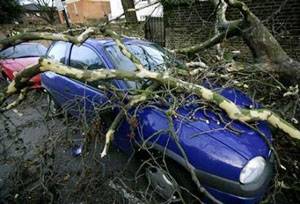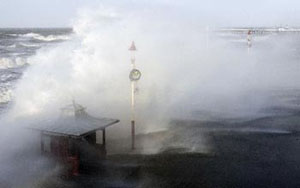| Tools: Save | Print | E-mail | Most Read |
| Europe Lashed By Storms, 27 Dead |
| Adjust font size: |
Hurricane force winds battered northern Europe, killing at least 27 people and triggering a dramatic air-sea rescue from a sinking cargo ship in the English Channel. The storms brought torrential rains and winds gusting at close to 170 kilometers per hour (105 miles per hour) to areas of southern Britain, northern France, the Netherlands, Germany and the Czech Republic.
Falling trees and pylons claimed the lives of seven motorists, including the managing director of central England's Birmingham airport, killed when a branch fell on his car as he was driving to work. In all, 10 people were killed in storm-related accidents in England, seven in Germany, five in the Netherlands, three in the Czech Republic and two in France. Most of the deaths were caused by traffic accidents and falling debris. Meteorologists at London's Met Office said the winds reached "severe gale force" in Britain and were the highest recorded since January 1990. Further warnings came, indicating the storm would intensify as it headed east across the continent. Winds of almost 170 kph were recorded later Thursday in Germany. "Denmark, Netherlands and Germany were expected to be more severely affected by the storm as it tracked across them through this evening," the office said on its website. In Munich, an 18-month-old baby was crushed to death by a door that was torn off its hinges, while a 73-year-old man was killed when a barn door fell on him in Bavaria. In the southern Dutch town of Riel, an 11-year-old boy died after he was hit by a car, the driver saying the child had been blown into the car by a sudden gust of wind. A pensioner was crushed when a wall collapsed on her near Stockport in northwest England, while a man was killed after being blown into a metal shutter at an industrial estate in Manchester. In the Czech Republic, a fireman was killed by a falling tree, while two youths crushed in their car by a falling tree on the outskirts of the capital Prague. The high winds generated chaos across the country, downing power lines and disrupting transport with forecasters warning of worsening conditions overnight.
In the English Channel, 26 crew forced to abandon their sinking freighter were airlifted to safety in a daring joint French-British operation launched in hazardous conditions. The French coastguard said all the men who had been huddling in a lifeboat had been winched on board British Sea King helicopters and taken to the navy base at Culdrose in southwestern England. They had been forced to bail out from their London-registered cargo ship, the MS Napoli, after it developed a 1.5-metre (five-foot) gash just above the waterline. A spokesman for the British coastguard said the freighter was listing badly off the Cornish coastline. "We don't know yet whether it will go down," he said. French coastguard officials indicated the ship was carrying hundreds of tons of "dangerous" cargo including explosives and unspecified toxins, while a five-kilometer slick of oil pollution had been detected behind the vessel. The storms also forced the suspension of cross-Channel ferry services between the English port of Dover and France. Both road and rail transport in England were also heavily disrupted. German meteorologists said the storm was shaping up to be the worst in five years with citizens warned to venture outside only in exceptional circumstances. The winds led to numerous flight cancellations at Frankfurt airport. The head of the German rescue services, Albrecht Broemme, said tens of thousands of emergency workers were on standby. "If this hits all of Germany, things could become pretty bad," he said. In Paris, all public parks, gardens and cemeteries were closed as a precaution until the end of the violent weather. The Eurostar train service between Paris, Brussels and London was also briefly suspended before services resumed later in the day. The Dutch transport ministry took the unprecedented step of issuing a warning asking all motorists to avoid driving if possible. The Red Cross also set up temporary shelters for some 5,000 commuters who are stranded after the Netherlands shut down all rail traffic. In other transport chaos: -- British Airways cancelled 130 domestic flights; -- 100 flights were cancelled at Swiss airports; -- A train driver was injured when his locomotive hit a fallen tree in the Czech Republic; -- Deutsche Bahn railway company halted services across Germany. -- Amsterdam train station closed after glass plates were blown off the roof; -- Prague airport banned the use of passenger tunnels due to safety fears. (China Daily via agencies January 19, 2007) |
| Tools: Save | Print | E-mail | Most Read |
 |
| Related Stories |
|
|
Product Directory China Search |
Country Search Hot Buys |



